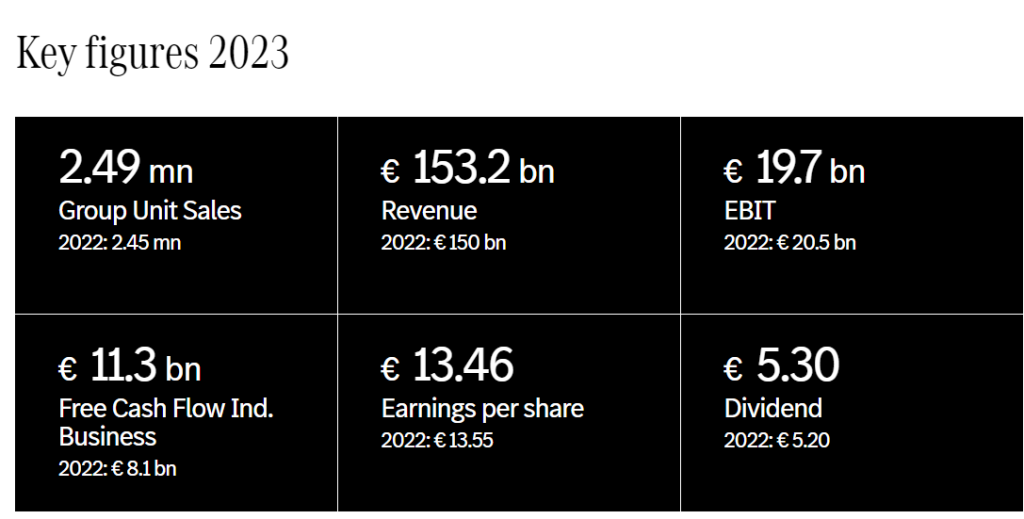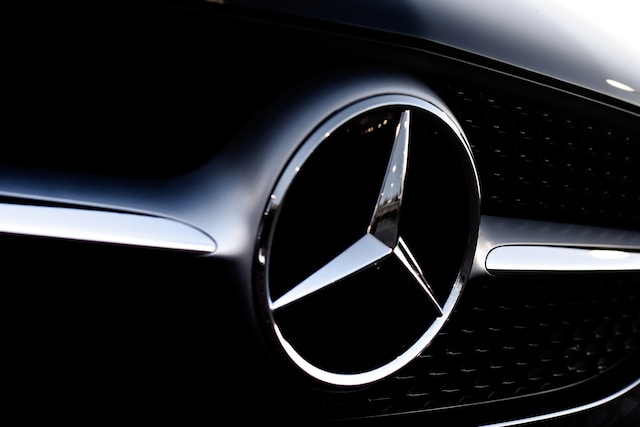Before we dive deep into the SWOT analysis, let us get the business overview of Mercedes Benz. Mercedes-Benz is a global luxury automobile brand and a German company Daimler AG division. The brand is known for its high-quality vehicles, including cars, trucks, buses, and vans, catering to diverse customers worldwide. Mercedes-Benz traces its origins back to 1886 when Karl Benz invented the first gasoline-powered automobile, the Benz Patent-Motorwagen.
Business Segments:
- Passenger Cars: Mercedes-Benz is a leading player in the luxury passenger car market, offering a wide range of vehicles, including sedans, coupes, convertibles, SUVs, and electric vehicles. Popular models include the C-Class, E-Class, S-Class, and the AMG high-performance lineup.
- Vans: Mercedes-Benz Vans division manufactures light commercial vehicles, such as the Sprinter, Vito, and Citan, catering to various industries like logistics, construction, and tourism.
- Trucks: The Mercedes-Benz Trucks division produces heavy-duty trucks, including the Actros, Arocs, Atego, and Econic models, which cater to industries such as logistics, construction, and waste management.
- Buses: Mercedes-Benz produces a range of buses, including city buses, intercity buses, and touring coaches, under the brands Mercedes-Benz, Setra, and BharatBenz.
- Electric Mobility: The EQ sub-brand focuses on developing and producing electric vehicles (EVs) and related technologies. Models under this brand include the EQC, EQA, and EQS.
- Financial Services: Mercedes-Benz Financial Services provides financing, leasing, and insurance solutions to customers and dealers, supporting the sales of Mercedes-Benz vehicles and services.
Mercedes-Benz geographically operates in various regions, including Europe, North America, Asia-Pacific, the Middle East, and Africa. The brand’s global presence and diversified portfolio have contributed to its position as a market leader in the luxury automobile segment.
Financial Performance 2023: Mercedes-Benz Group AG achieved solid 2023 financial results. A sharpened focus on desirable cars and vans combined with ongoing cost discipline resulted in Group Earnings Before Interest and Taxes (EBIT) of €19.7 billion (2022: €20.5 billion), and revenues of €153.2 billion (2022: €150.0 billion).
Here is a SWOT analysis for Mercedes Benz:
A SWOT analysis is a strategic planning tool used to evaluate the Strengths, Weaknesses, Opportunities, and Threats of a business, project, or individual. It involves identifying the internal and external factors that can affect a venture’s success or failure and analyzing them to develop a strategic plan. In this article, we do a SWOT Analysis of Mercedes Benz.
SWOT Analysis: Meaning, Importance, and Examples
Strengths
- Strong brand reputation: Mercedes-Benz is synonymous with quality, luxury, and performance. The brand has a long history of innovation and is associated with cutting-edge technology, engineering excellence, and superior design, which has helped it earn a strong reputation worldwide. Brand value increased by 10% to $56.103 billion since 2021.
- Diverse product portfolio: Mercedes-Benz offers a wide range of vehicles, including sedans, coupes, SUVs, trucks, vans, and buses, catering to a broad customer base. This diverse portfolio allows the brand to meet customer needs and preferences across market segments.
- Focus on innovation: Mercedes-Benz invests heavily in research and development to stay at the forefront of automotive technology. The company has pioneered various technological advancements, such as safety features, autonomous driving, and electric mobility, which help maintain its competitive edge.
- Global presence: The brand has a strong global presence, with manufacturing facilities, dealerships, and customer service centers spread across multiple regions. This extensive network enables Mercedes-Benz to cater to customers worldwide and take advantage of growth opportunities in emerging markets.
- Financial services: Mercedes-Benz Financial Services supports the brand’s vehicle sales by providing financing, leasing, and insurance solutions to customers and dealers. This integration of financial services helps facilitate the purchase of Mercedes-Benz products and enhances customer loyalty.
- Skilled workforce: Mercedes-Benz employs a skilled workforce of engineers, designers, and other professionals, who are dedicated to maintaining the brand’s commitment to quality and innovation. This talent pool is essential for the company’s ongoing success and the developing of new products and technologies.
- Commitment to sustainability: Mercedes-Benz is focused on incorporating sustainability into its business operations, including developing electric vehicles, reducing its carbon footprint, and utilizing eco-friendly materials in its vehicles. This commitment to sustainability is increasingly important as consumer preferences shift towards environmentally friendly products and practices.

Weaknesses
- High production costs: Mercedes-Benz vehicles are known for their high-quality materials, advanced technology, and precision engineering, contributing to increased production costs. These costs can make it challenging for the company to compete on price, especially in markets where affordability is a key factor.
- Dependence on mature markets: A significant portion of Mercedes-Benz’s sales comes from mature markets, such as Europe and North America. Economic downturns or stagnation in these regions can negatively impact the company’s revenue and growth prospects.
- Complexity in the product lineup: Although a diverse product portfolio is a strength for Mercedes-Benz, it can also lead to customer complexity and confusion. With many models and options available, customers might find it challenging to choose the most suitable vehicle for their needs.
- Regulatory challenges: As a global automotive company, Mercedes-Benz faces many regulations and compliance requirements in different countries. These regulations can be complex, time-consuming, and costly, potentially affecting the company’s ability to operate efficiently and expand in certain markets.
- Late entry into the electric vehicle market: While Mercedes-Benz has introduced its EQ sub-brand and announced plans for new electric vehicle models, the company was relatively slow to enter the electric vehicle market compared to competitors like Tesla, BMW, and Audi. This delay may have resulted in a loss of market share and brand image in the growing EV segment.
- Recalls and quality issues: Mercedes-Benz has faced some recalls and quality issues in the past, which can negatively impact the brand’s reputation and customer trust. Ensuring high-quality production and promptly addressing quality concerns are crucial for maintaining the brand’s image.
- Competitive market: The luxury automotive market is highly competitive, with several well-established brands like BMW, Audi, Lexus, and Tesla fighting for market share. In this competitive landscape, Mercedes-Benz must continually innovate and differentiate itself to maintain its position and attract new customers.
Opportunities
- Electric vehicle market: The growing demand for electric vehicles (EVs) presents a significant opportunity for Mercedes-Benz. The company can expand its EQ sub-brand and introduce new EV models to cater to the increasing environmental consciousness of consumers and comply with stricter emission regulations. Mercedes-Benz announced an investment of more than 60 billion between 2022 and 2026 to go fully electric.
- Autonomous driving technology: As the automotive industry moves towards self-driving vehicles, Mercedes-Benz can leverage its expertise in innovation and technology to develop advanced autonomous driving systems. This could attract new customers and set the brand apart from competitors.
- Expansion in emerging markets: Developing economies such as China, India, and Brazil offer growth opportunities for luxury car manufacturers like Mercedes-Benz. The company can increase sales and diversify its revenue sources by focusing on these markets.
- Strengthening digital capabilities: Enhancing digital capabilities in online sales, virtual showrooms, and personalized customer experiences can help Mercedes-Benz adapt to the changing automotive landscape and meet evolving customer expectations.
- Partnerships and collaborations: Collaborating with technology companies, startups, and other automotive manufacturers can help Mercedes-Benz access new technologies and resources, drive innovation, and improve its products and services.
- Shared mobility and vehicle subscription services: As consumer preferences shift towards shared mobility and vehicle subscription services, Mercedes-Benz can explore opportunities in this sector by offering luxury car-sharing or subscription-based services.
- Focus on sustainability: By emphasizing sustainability in its operations, Mercedes-Benz can appeal to environmentally conscious consumers and comply with regulatory requirements. This includes investing in renewable energy, developing eco-friendly materials, and reducing manufacturing processes’ environmental impact.
- Customization and personalization: Offering more customization and personalization options for customers can help Mercedes-Benz differentiate itself from competitors and increase customer loyalty. This could involve providing unique design options, performance enhancements, or exclusive features for individual customers.
Threats
- Intense competition: The luxury automotive market is highly competitive, with well-established brands like BMW, Audi, Lexus, and Tesla vying for market share. Increased competition can lead to price pressures, reduced margins, and the need for continuous innovation to maintain a competitive edge.
- Changing regulations: Stricter environmental regulations and emission standards worldwide can impact the automotive industry, forcing companies like Mercedes-Benz to invest in cleaner technologies like electric vehicles and alternative fuels. Failure to adapt to these regulations could result in financial penalties and loss of market share.
- Economic fluctuations: Economic downturns or recessions can reduce consumer spending, particularly on luxury goods like high-end vehicles. This could negatively impact Mercedes-Benz’s sales and profitability, especially in mature markets where the brand has a strong presence.
- Technological disruption: Rapid technological advancements, such as autonomous driving, connected cars, and electric vehicles, can disrupt traditional automotive business models. Mercedes-Benz must continually invest in research and development to stay ahead of these trends and maintain its competitive position.
- Supply chain disruptions: Mercedes-Benz, like other automotive manufacturers, relies on a complex global supply chain for components and raw materials. Supply chain disruptions due to natural disasters, geopolitical tensions, or other factors can negatively impact the company’s production and overall business operations.
- Cybersecurity threats: As vehicles become increasingly connected and reliant on digital technology, cybersecurity threats become a growing concern. Mercedes-Benz must invest in robust cybersecurity measures to protect its vehicles, customer data, and reputation.
- Shift in consumer preferences: Changing consumer preferences and the growing popularity of alternative transportation modes, such as ride-sharing services and public transportation, could impact demand for personal vehicles, including luxury cars like Mercedes-Benz.
- Brand reputation risks: Any negative publicity, such as product recalls, quality issues, or corporate scandals, can damage Mercedes-Benz’s brand reputation and customer trust, potentially leading to a decline in sales and market share.











